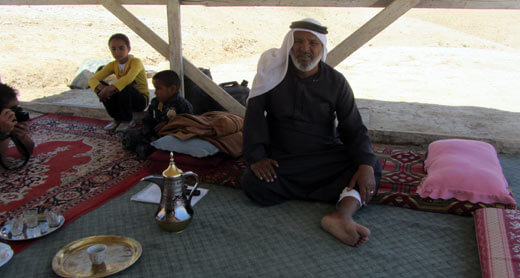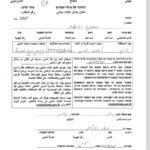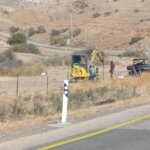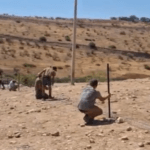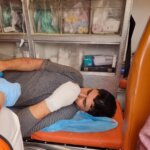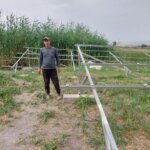B’Tselem:35 residents of Wadi al-Qatif west of Jericho face imminent expulsion
The Bedouin community of Wadi al-Qatif, located west of the city of Jericho, is home to 10 families comprising 68 people, including 32 minors. The community’s roots are in Tel Arad in the Negev, southern Israel. After becoming refugees, they moved in the 1950s to the Hebron region and then, in 1982, to the area near Jericho, in search of pastureland that would enable them to maintain their traditional lifestyle. There are 16 school-age children in Wadi al-Qatif and they study either in Jericho or in ‘Aqbat Jaber Refugee Camp. The community has 18 residential huts, largely donated by the European Union, as well as a large hospitality tent and six sheep-pens that house their approximately 500 head of sheep.
The residents of the community have no alternative housing or place to live. As they earn their living tending sheep, in springtime, some of the residents lead the flocks to pasture in the Ramallah area, while the rest of the population stays behind. Eight years ago, Israeli security forces began restricting the movement of the community’s shepherds, prohibiting them to come any nearer than one kilometer to the settlement of Mitzpe Yeriho. Ever since 2008, when Route 1 was laid out between the settlement and Wadi al-Qatif, Israeli security forces have not allowed the shepherds to cross from their side of the road to the other. The community is hooked up to the water grid, yet it endures long periods when no water is supplied. The community is not hooked up to the power grid; it relies on a generator for electricity.
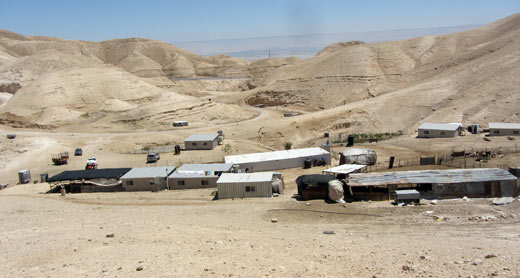 In 2012, the Civil Administration issued demolition orders for construction without a permit for all structures in Wadi al-Qatif. The residents turned to Att. Shlomo Lecker, who added the community to the petition he had already filed to the High Court of Justice to countermand demolition orders issued for other Bedouin communities in the area. In November 2012, the High Court of Justice issued an interim injunction that prohibited further demolition pending the state’s response to the petition. The state repeatedly postponed its response. At a session of the High Court on 24 April 2014, the state said it is interested in relocating the community to the region of Nu’eimeh, north-west of Jericho, where it plans to settle thousands of other Bedouins from the vicinity.
In 2012, the Civil Administration issued demolition orders for construction without a permit for all structures in Wadi al-Qatif. The residents turned to Att. Shlomo Lecker, who added the community to the petition he had already filed to the High Court of Justice to countermand demolition orders issued for other Bedouin communities in the area. In November 2012, the High Court of Justice issued an interim injunction that prohibited further demolition pending the state’s response to the petition. The state repeatedly postponed its response. At a session of the High Court on 24 April 2014, the state said it is interested in relocating the community to the region of Nu’eimeh, north-west of Jericho, where it plans to settle thousands of other Bedouins from the vicinity.
Justice Uzi Fogelman instructed the attorney representing the Civil Administration to have a concrete plan for resettling the community submitted to Att. Lecker within a week. However, on 28 April 2014, four days after the court session, while the court and the community’s legal counsel were waiting to receive the plan, representatives of the military and the Civil Administration arrived at Wadi al-Qatif and served eviction orders to four families comprised of 35 individuals, including 15 minors. The order stated the families must vacate the premises within 48 hours because they are in a closed military zone designated for training. Wadi al-Qatif’s legal counsel filed an urgent application to amend the petition so as to have it encompass the eviction orders as well as the demolition orders. Today, 4 May 2014, the High Court of Justice issued an interim injunction, prohibiting the evacuation of the residents and directing the state to respond to the requested amendment to the petition within 45 days.
 Attempts to expel the members of Wadi al-Qatif from their site of residence are part and parcel of the Israeli endeavors to expel – on a variety of pretexts – thousands of Palestinians who live in dozens of communities throughout Area C. In the Ma’ale Adumim-Jericho area, these endeavors may be seen in the Civil Administration plan to establish “permanent sites” for the relocation of Bedouin communities in the West Bank. According to the Civil Administration, the plan’s objective is to improve the standard of living of these communities and to provide proper housing conditions. That said, the plan was drawn up without consulting the residents at all, irrespective of that fact that it dictates an extreme change in their lifestyle and means of livelihood. According to the media, the plans are only for urban communities, thereby making it extremely difficult for the residents to make a living as farmers and shepherds.
Attempts to expel the members of Wadi al-Qatif from their site of residence are part and parcel of the Israeli endeavors to expel – on a variety of pretexts – thousands of Palestinians who live in dozens of communities throughout Area C. In the Ma’ale Adumim-Jericho area, these endeavors may be seen in the Civil Administration plan to establish “permanent sites” for the relocation of Bedouin communities in the West Bank. According to the Civil Administration, the plan’s objective is to improve the standard of living of these communities and to provide proper housing conditions. That said, the plan was drawn up without consulting the residents at all, irrespective of that fact that it dictates an extreme change in their lifestyle and means of livelihood. According to the media, the plans are only for urban communities, thereby making it extremely difficult for the residents to make a living as farmers and shepherds.
As the occupying power in the West Bank, Israel must allow the local residents to lead normal lives. This includes allowing them to build homes lawfully. Expelling residents of an occupied territory from their homes to make way for military training is unlawful. Expulsions are permitted under international law only under exceptional circumstances, such as urgent military needs or for protecting the local population. Even then, the expulsion must be temporary, the residents must be provided with reasonable alternative accommodation, and, whatever the circumstances, they must be allowed to return home as soon as possible. Clearly, expulsion in this case fails to meet any of these criteria. In any event, the residents were never offered an appropriate alternative solution that would allow them to maintain their way of life. Expulsion would render them homeless and eliminate their ability to make a living. B’Tselem calls on the relevant authorities to allow the residents of Wadi al-Qatif to remain living in their present location and to tend to their flocks there, as they have been doing for the past 30 years.

